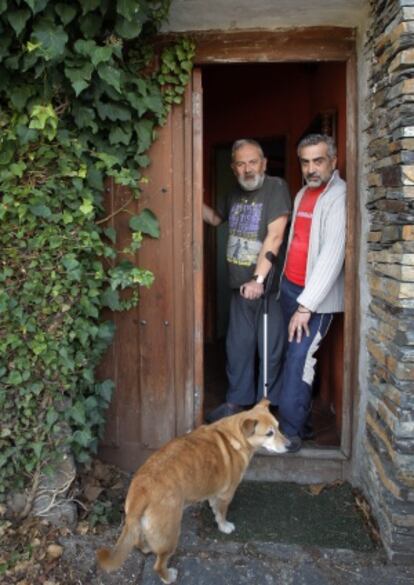Why the "Iberian Las Vegas" is afraid of a Rajoy victory
Campillo de Ranas has become famous for its gay marriage ceremonies
If you were to get together all of the residents of Campillo de Ranas in Guadalajara, they would fit inside a single building. They are 50 in all, and most are "self-exiled" from the large cities or, as they like to call themselves, "neo-rural residents."
Campillo is unusual because it holds the record of being the Spanish town where the highest number of gay weddings has been held. The hamlet, along with its Socialist Mayor Francisco Maroto, has been profiled in The New York Times and Time magazine, which described the town as "the Iberian Las Vegas." But now the mayor and Campillo's residents fear that the Popular Party (PP) and its candidate Mariano Rajoy will abolish the 2005 law that legalized gay marriage.
"I get the feeling that there is a lot of concern," says Maroto. "I am performing marriages every weekend. I haven't stopped. Sometimes I preside over three weddings in one day.
"A lot of people tell me they fear that Mariano Rajoy will revoke the law, so they prefer to go ahead with their weddings before it is too late," he says.
"The PP encouraged a campaign of conscientious objectors, and many mayors came out and said that they were not going to perform any such marriages. The justice of peace here had to resign because he refused to register gay marriages on his roll books," recalls Maroto.
Located in the Ocejón valley, Campillo de Ranas was also made famous by a television commercial where an old goat herder asks: "What? Spain won the European Championship again?" Andrés F. Rubio's documentary Campillo, Yes I do became a big hit around the world when it was released in 2007.
"At the premieres, I felt like an ambassador for Spain. For the first time, we were known for something novel," Maroto says.
But celebrating weddings isn't the only unusual thing about Campillo. Many people, often from the big cities, are buying up homes in this quaint town. Even gay couples like Julián Corral and his partner Alberto.
Corral, a former accountant, and Alberto, who works for an animation company, decided to leave everything behind in Madrid and open a bar La Garduña in Campillo. "There is a lot of tolerance here," says Julián, who bristles with anger after seeing a summary of last week's debate between Rajoy and the Socialist prime ministerial candidate, Alfredo Pérez Rubalcaba.
"I came out of the closet late in life. I was 37, now I am 57. I have been with my partner for 20 years. It is my right to be able to get married. That was a stupid thing for the PP to file an appeal with the Constitutional Court. I think the PP would like to see all homosexuals go back in the closet."
Julián López, 46, another resident, says he loves the idea that Campillo holds the record for the number of gay marriages.
"I came here 14 years ago from Carabanchel. I have things here that I could never have in Madrid - a 200-square meter home, a parking garage and a restaurant."

Tu suscripción se está usando en otro dispositivo
¿Quieres añadir otro usuario a tu suscripción?
Si continúas leyendo en este dispositivo, no se podrá leer en el otro.
FlechaTu suscripción se está usando en otro dispositivo y solo puedes acceder a EL PAÍS desde un dispositivo a la vez.
Si quieres compartir tu cuenta, cambia tu suscripción a la modalidad Premium, así podrás añadir otro usuario. Cada uno accederá con su propia cuenta de email, lo que os permitirá personalizar vuestra experiencia en EL PAÍS.
¿Tienes una suscripción de empresa? Accede aquí para contratar más cuentas.
En el caso de no saber quién está usando tu cuenta, te recomendamos cambiar tu contraseña aquí.
Si decides continuar compartiendo tu cuenta, este mensaje se mostrará en tu dispositivo y en el de la otra persona que está usando tu cuenta de forma indefinida, afectando a tu experiencia de lectura. Puedes consultar aquí los términos y condiciones de la suscripción digital.








































